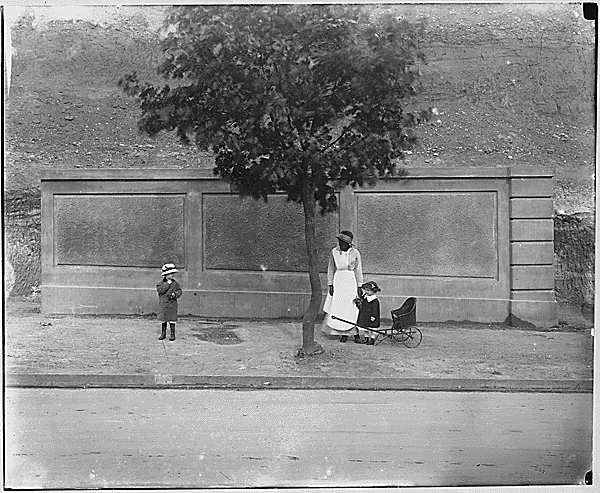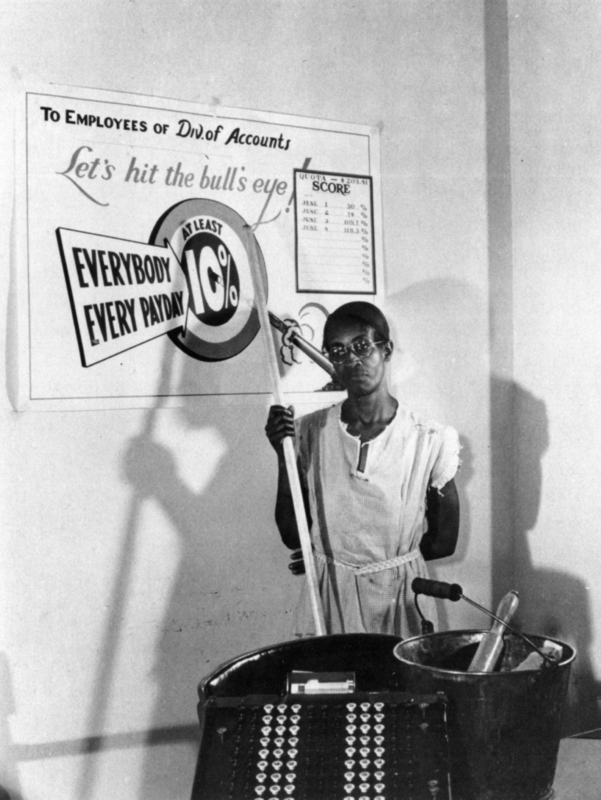Giving the “forgotten women a chance to eat and a day to lie in bed and rest”
Though they can’t pass a budget, the New York State Assembly is shortly expected to pass the nation’s first law that would provide basic employment protections and benefits–paid holidays, sick days and vacation days, overtime wages, 14-days notice and termination pay–to domestic workers. Â The law stands to significantly improve the rights and quality of life for thousands of domestic workers, including nannies, cooks and maids, most of whom are women.
Domestic workers were left out of the original New Deal programs that established protections for working people. Â Domestic workers, along with agricultural laborers, were left out precisely because so many of them were African Americans; about 60% of the nation’s black workers toiled in these two broadly defined occupations. Â As noted in Who Built America?, Vol. Two:
Many of the New Deal programs…denied equal benefits to African-Americans–in part because of the power of southern Democrats in the New Deal coalition. Â Southern employers worried that federal Social Security benefits would discourage black workers from taking low-paying jobs in their fields, factories, and kitchens. Â Thus, old-age insurance covered neither [group]… Â Furthermore, unemployment insurance excluded sharecroppers–black or white–and farm laborers. (Who Built America? Volume Two: 1877 to the Present, p. 450)

"Meridian Hill Park. View showing texture of concrete in lower wall. Maid with small children in view. Washington, D.C., 1776-1930" (National Archives)
Gordon Parks, a Farm Security Administration photographer, brilliantly captured the irony of an unprotected charwoman, Mrs. Ella Watson, who was employed by the federal government in the halls where New Deal legislation was enacted and administered, working in front of a sign that encouraged worker morale:

"Washington, D.C. Government charwoman who provides for a family of six on her salary of one thousand and eighty dollars per year" (Library of Congress)
In our Teaching American History and Making Connections seminars, we use the portrait series of Ella Watson and the following letter from an anonymous hotel maid to Eleanor Roosevelt decrying the exclusions of women workers from New Deal programs:
Atlanta, Georgia, February 19, 1937
Dear Mrs. Roosevelt:
Since Congress is in session again, and our wonderful President is also again on the job, I am begging you to help assist the women working in hotels in this country, especially in the South. I have been in the work since I was 32 years of age, and I am near 61 now, and on a hard job in one of our best hotels here in Atlanta, in the salad department.
I leave home at 10:30 A.M. to be on the job at 12 o’clock. I work like fighting fire, until 10 at night, and more than that….
Well…what do I get per month for this fast hard work seven days per week and overtime and to 12:30 on Saturday nights. I get $35 per month, and 60 cents out of that on the Old Age Pension. So you see they rate me at $60. I wear some old ragged uniforms that the coffee shop girls have discarded and an average of three per week are run though their house laundry.
I am an old experienced worker, and fast and clean and give full satisfaction, but that is the life of a Southern hotel woman worker. Young men soon get better pay while the poor women are made the goat on and on. Me and the colored help scrub at night. Me in my dept., and the negros for the cooks and cold meat counters. The men smoke cigarettes and laugh and talk.
Mrs. Roosevelt, is this fair to women in any section of the country, and can you not influence the President to make laws that will stop it. Laws—with six days and 48 hours per week….
We are not fighting for a 30 hour week, we are breaking in health under 10 to 12 hours a day of fast hard work in a hot hot kitchen (will not let cold air in during serving hours) and only beg for 8 hours in a straight watch (not a split watch) and one day to lie in bed, and rest….
I am so old that you cannot do me much good, but for the younger ones it can be a blessing in the coming years. What do I get out of life, and on pay day what do I have, and we all give to Red Cross also.
I am hoping that Dr. Townsend[*] will sometime bring a better pension than we have so far. Capital will not pay us a living wage, so it must come some other route. I am opposed to Coughlin[*] and all those crokers, but I believe that Townsend himself means well.
Thanking you for reading this petition, and hope you may see just what we live under while men are fighting for six hours and more pay. Give the forgotten women in Southern Hotels a chance to eat, and a day to lie in bed and rest from the hard work…
M.W.
(Source: Gerald Markowitz and David Rosner, “Slaves of the Depression”: Workers’ Letters about Life on the Job (Ithaca and London: Cornell University Press, 1987), 155-7.)
The machinations of the 1930s that kept low-payed, mostly black workers unprotected and without access to pensions, benefits, and job security, now primarily impact immigrants, both documented and undocumented, who fill many similar positions picking vegetables, slaughtering chickens, and minding children in today’s economy. Â Perhaps the new law in New York can become an example to other states and the federal government to finally protect these workers, too.
*M.W.’s letter refers to two popular critics of the New Deal, Charles E. Coughlin and Dr. Francis Townsend. “Father” Coughlin was a Catholic priest who argued for stronger government control and social legislation to combat the evils of industrialism. Dr. Townsend, a California physician, proposed that every citizen over sixty who was not working should receive $200 a month from the government “on the condition that they spend the money as they get it.” Both Townsend and Coughlin attacked the unequal distribution of wealth and power, but fell short of advocating socialism. Their popularity with Americans during the Depression impacted FDR’s Second New Deal by emboldening the President to pass stronger relief measures.
Last 5 posts by Leah Nahmias
- Teaching "What This Cruel War Was Over" - March 28th, 2011
- State of Siege and Public Memory at Ole Miss - March 25th, 2011


